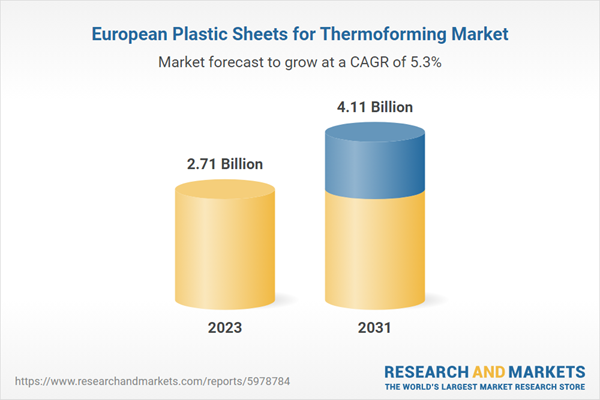Plastic sheets for thermoforming are versatile materials extensively used across various industries for shaping into desired forms through heat-based processes. Polyolefins, including polyethylene and polypropylene, offer excellent flexibility, impact resistance, and transparency, making them ideal for packaging applications such as food containers, blister packs, and disposable cups. ABS plastic sheets are renowned for their exceptional strength, rigidity, and heat resistance, making them suitable for automotive parts, electronics housings, and consumer goods.
The thermoforming process offers several advantages, including cost-effectiveness, design flexibility, and rapid production capabilities, making it suitable for a wide range of applications across various industries. One of the primary industries driving the demand for plastic sheets for thermoforming is healthcare. The healthcare sector utilizes thermoformed plastic parts for medical packaging, disposable medical devices, equipment housings, and components for medical devices. Plastic sheets made from polyolefins and ABS offer biocompatibility, sterilizability, and chemical resistance, making them ideal for medical applications where hygiene and safety are paramount. Thermoforming processes allow for the production of medical-grade components with tight tolerances and regulatory compliance, driving the adoption of plastic sheets in the healthcare industry.
Based on thermoforming type, the Europe plastic sheets for thermoforming market is segmented into vacuum forming, pressure forming, twin-sheet forming, and others. In 2023, vacuum forming segment held a significant market share and is expected to be the fastest-growing segment during the forecast period. In the vacuum-forming process, heat and pressure are used to draw plastic sheets into their final product configuration. Plastic sheets, after heating, are placed over a mold, and a vacuum is used to design the heated plastic into the desired shape. Vacuum forming is a widely used process among all the thermoforming processes as it is easy and affordable. Vacuum forming is highly employed in the production of a wide range of products, such as packaging materials, trays, display cases, and vehicle interior components. For example, vacuum forming is used in the manufacturing of blister packaging in the pharmaceutical industry, providing protective and visually appealing enclosures.
Pressure forming is a type of thermoforming process that applies additional pressure for the formation of a vacuum. The plastic sheet, after heating, is forced into the shape of the mold, creating a textured surface, undercuts, and sharp corners that are challenging to achieve with the vacuum forming process. In the pressure-forming process, the pressure applied is two to four times that of vacuum forming, which results in achieving durable and uniform thermoformed products. Pressure forming is most suitable for products that require intricate style and aesthetic qualities. The major application of pressure forming includes the manufacturing of products such as point-of-purchase displays, high-quality retail display cases, and consumer electronics products.
Europe has been at the forefront of sustainability initiatives, with the EU implementing ambitious targets to reduce plastic waste and promote a circular economy. As a result, there is a growing emphasis on incorporating recycled materials into manufacturing processes, including thermoforming, to address environmental concerns and meet regulatory requirements. Recycled plastic sheets offer several advantages that align with Europe's sustainability goals. By utilizing recycled plastics, manufacturers can reduce the consumption of finite resources, lower carbon emissions, and decrease dependence on fossil fuels. Recycling plastic waste helps divert materials from landfills and reduces pollution, contributing to a cleaner and more sustainable environment.
Consumers are increasingly seeking sustainable alternatives and are willing to support brands that prioritize environmental responsibility. Thermoformed products made from recycled plastic sheets can be marketed as environmentally friendly options, appealing to eco-conscious consumers and enhancing brand reputation. As sustainability becomes a key differentiator in the market, manufacturers are under pressure to integrate recycled materials into their products to remain competitive. Thus, the growing consumer awareness and demand for eco-friendly products are driving the adoption of recycled plastic sheets in Europe.
BEN Kunststoffe Vertriebs GmbH, Senoplast Klepsch & Co GmbH, Ondaplast Spa, Sky-light AS, PAR Group Ltd, MITRAS Materials GmbH, Nizza Plastic Co Ltd, NUDEC SA, Bay Plastics Ltd, and LADA-LIST LLC, are among the leading players in the Europe plastic sheets for thermoforming market. These companies are adopting mergers & acquisitions and product launches to expand their geographic presence and consumer bases.
The overall Europe plastic sheets for thermoforming market size has been derived using both primary and secondary sources. To begin the research process, exhaustive secondary research has been conducted using internal and external sources to obtain qualitative and quantitative information related to the market. Also, multiple primary interviews have been conducted with industry participants to validate the data and gain more analytical insights. Participants of this process include industry experts such as VPs, business development managers, market intelligence managers, and national sales managers - along with external consultants, including valuation experts, research analysts, and key opinion leaders - specializing in the Europe plastic sheets for thermoforming market.
Table of Contents
Companies Mentioned
- BEN Kunststoffe Vertriebs GmbH
- Senoplast Klepsch & Co GmbH
- Ondaplast Spa
- Sky-light AS
- PAR Group Ltd
- MITRAS Materials GmbH
- Nizza Plastic Co Ltd
- NUDEC SA
- Bay Plastics Ltd
- LADA-LIST LLC
Table Information
| Report Attribute | Details |
|---|---|
| No. of Pages | 107 |
| Published | May 2024 |
| Forecast Period | 2023 - 2031 |
| Estimated Market Value ( USD | $ 2.71 Billion |
| Forecasted Market Value ( USD | $ 4.11 Billion |
| Compound Annual Growth Rate | 5.3% |
| Regions Covered | Europe |
| No. of Companies Mentioned | 10 |









